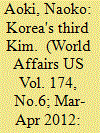| Srl | Item |
| 1 |
ID:
115064


|
|
|
|
|
| Publication |
2012.
|
| Summary/Abstract |
The death of Kim Jong-il and subsequent dynastic transfer of power in North Korea caused a spasm of hope in the policy community that the secretive and totalitarian nation might embark on economic and political reforms. As the new leader, Kim Jong-un, was exposed to Western affluence while receiving his education in Switzerland-so the wishful thinking goes-surely he would realize the benefits of opening up his country. In fact, the young and inexperienced scion of the Kim dynasty derives his legitimacy solely from his family heritage. He has every reason to perpetuate the oppressive system built by his grandfather and buttressed by his father. In fact, how much Kim Jong-un's ideas and beliefs matter will remain questionable, at least over the short term. It is reasonable to assume that the untested leader will be guided by guardians or perhaps regents. This means that he may not be the one calling the shots, at least for the time being. The opaqueness of the power structure, meanwhile, has important implications for the outside world. The consolidation of power is likely to be still in progress, and it would take months-possibly even longer-for outside observers to learn how policies are determined. With Kim Jong-il, the world at least knew with whom it was dealing. Under Kim Jong-un, we may not even enjoy that advantage for some time to come.
|
|
|
|
|
|
|
|
|
|
|
|
|
|
|
|
| 2 |
ID:
164194


|
|
|
|
|
| Summary/Abstract |
Structured analytic techniques (SATs) are intended to improve intelligence analysis by checking the two canonical sources of error: systematic biases and random noise. Although both goals are achievable, no one knows how close the current generation of SATs comes to achieving either of them. We identify two root problems: (1) SATs treat bipolar biases as unipolar. As a result, we lack metrics for gauging possible over-shooting—and have no way of knowing when SATs that focus on suppressing one bias (e.g., over-confidence) are triggering the opposing bias (e.g., under-confidence); (2) SATs tacitly assume that problem decomposition (e.g., breaking reasoning into rows and columns of matrices corresponding to hypotheses and evidence) is a sound means of reducing noise in assessments. But no one has ever actually tested whether decomposition is adding or subtracting noise from the analytic process—and there are good reasons for suspecting that decomposition will, on balance, degrade the reliability of analytic judgment. The central shortcoming is that SATs have not been subject to sustained scientific of the sort that could reveal when they are helping or harming the cause of delivering accurate assessments of the world to the policy community.
|
|
|
|
|
|
|
|
|
|
|
|
|
|
|
|